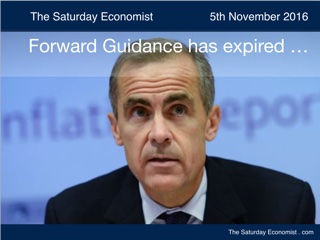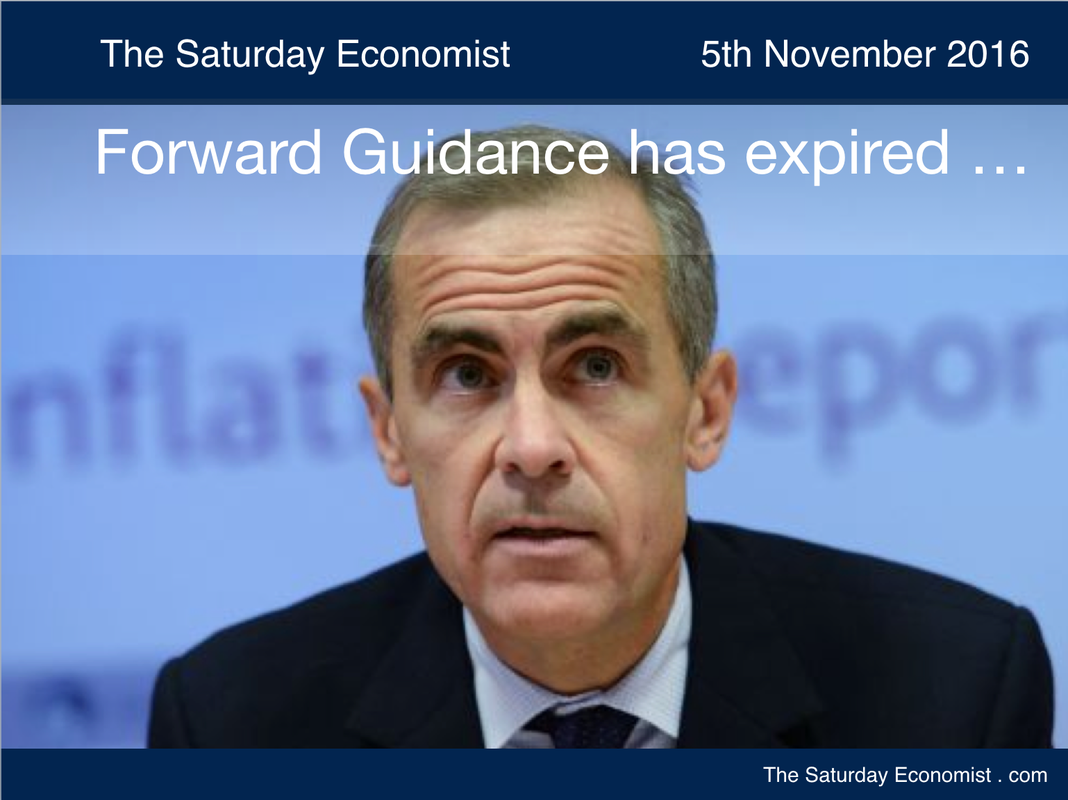 Forward Guidance has expired ... The Bank of England inflation report this week, the Governor is warning about inflation and rising wages. August forward guidance has expired. There is no prospect of a further rate cut in December. The next move in rates will be up, especially if the Fed makes the move before the end of the year. The Bank has revised growth forecasts for the current year to 2.1% compared to expectations of almost half that three months ago. The about turn is an embarrassment for the Bank of England. Obsession with now-casting allowed the model to be swayed by the July snap survey data from Markit PMI. When presented with information which confirms that which is already believed, the natural reaction is to accept new information without question. We call this "Confirmation Bias". The July data confirmed worst fears about a post referendum crash. No time to challenge fundamentals. "Conformation Bias" led to rate cuts and Q.E. expansion which was unnecessary given the strength of growth in Q3. The economy expanded by 2.3% in the post referendum quarter, making a nonsense of the Threadneedle Street grasp of economic reality. The Bank now expects growth of 2.1% this year slowing to 1.4% in 2017. NIESR produced their November update this week. Growth is expected to be 2.0% slowing to 1.4% next year. Why so gloomy about next year? Fears about investment and consumer spending, as real incomes are squeezed, are the two big question marks about growth. We expect growth of 2% this year and 1.8% next. Consumer spending and the leisure pound will continue to drive service sector growth with little hopes for expansion in manufacturing and construction. Investment, driven by expansion in housing and commercial real estate, will slow to growth of 1.2% this year and 1.5% next. And what of inflation ... The Bank expects CPI inflation to peak at just below 3% in the first quarter of 2018. NIESR expects inflation to peak at just below 4% in the final quarter of 2017. Contrarian as always we expect inflation to peak in the first quarter of next year at just over 3% before slowing to around 2.4% by the end of the year. The cost of living increase, driven by hikes in petrol, energy and food, will occur just in time for the April pay round. For the first time in many years, business will face difficult decisions about pay increases and pricing policies. The Bank expects earnings to rise towards 4% over the next two years, compounding the challenge. So how will the Bank react to rising inflation? The Governor is committed to a "see through" policy. Allowing the inflation shock of Sterling depreciation to work through the system, without an increase in base rates. The bank model assumes the inflation impact of a sterling depreciation takes two to three years to "work through" the economy. It is nonsense of course. The "Marmite" issue, love it or like it, argues the impact is much more immediate. We shall soon see. Rates should begin to rise to normalise capital pricing, restoring stability for gilt yields and savers in the escape from Planet ZIRP. According to the Debt Management Office, the value of gilts in issue increased to £1.9 trillion by the end of the second quarter this year. An increase of £250 billion in twelve months funded by the kindness of strangers and the reluctant participation of pension funds. No wonder the Bank had to "Chip In" with the £40 billion Q.E. loan to government. Gilt yields have rallied to 1.2% in recent weeks and are set to rise higher into 2017. So what of Sterling ...? The Governor has made it clear. The MPC has an inflation target. It does not have a currency target. The Bank will not engage in activity to support Sterling with rate moves or currency manipulation. Sterling should be able to find the "appropriate" level to match market ambitions from capital flows. Sterling rallied to $1.25 against the dollar this week, despite the prospects of a U.S rate hike. There was a modest rally against the Euro to €1.124. We expect a dollar rally assuming a Clinton win this month and a Fed rise next month. Nevertheless, it is clear Sterling is oversold against the Dollar and the Euro. There is nothing in the text books about a Brexit shock to currency value. It will be some time yet before the Brexit deal is finalised. The Governor will be back in Toronto, long before the "supply shock" is established. Sterling is set to rally despite the fears about Europe and the current account deficit. And what of the Current Account Deficit ...? Despite or partly because of the weakness of Sterling, we expect the balance of payments deficit to increase to £48 billion this year, rising towards £50 billion in 2017. At 2.5% of GDP, the easing of the current account deficit is unlikely to occur anytime soon. Funding costs are set to rise.The Bank of England will be unable to avoid a rate hike in the Great Escape from Planet ZIRP. So what happened to Markets? Markets, were down on U.S. election fears - the Dow closed at 17,974 from 18,168. The FTSE closed at 6,693 from 6,996. Sterling was up against the Dollar to $1.250 from $1.216 and up against the Euro to €1.124 from €1.111. The Euro rallied against the Dollar to 1.112 from 1.094. Oil Price Brent Crude closed at $45.45 from $49.95 The average price in November last year was $44.27. UK Gilts - yields moved down. UK Ten year gilt yields closed at 1.15 from 1.27. US Treasury yields moved to 1.74 from 1.85. Gold closed at $1,296 from $1,267. John That's all for this week ... if you enjoy The Saturday Economist .. JOIN THE SATURDAY ECONOMIST CLUB as an INDIVIDUAL member from just £40 a year. Just click to sign up. Special reports, Survey Results and the Quarterly Economic Outlook are made available to members and sponsors. © 2016 John Ashcroft and Company, Economics, Strategy and Social Media, experience worth sharing. ______________________________________________________________________________________________________________ The material is based upon information which we consider to be reliable but we do not represent that it is accurate or complete and it should not be relied upon as such. We accept no liability for errors, or omissions of opinion or fact. In particular, no reliance should be placed on the comments on trends in financial markets. The receipt of this email should not be construed as the giving of advice relating to finance or investment.. ______________________________________________________________________________________________________________ If you do not wish to receive any further Saturday Economist updates, please unsubscribe using the buttons below or drop me an email at [email protected]. If you enjoy the content, why not forward to a friend, the can sign up here ... _______________________________________________________________________________________ For details of our Privacy Policy and our Terms and Conditions check out our main web site. John Ashcroft and Company.com _______________________________________________________________________________________________________________ Copyright © 2016 The Saturday Economist, All rights reserved. You are receiving this email as a member of the Saturday Economist Mailing List. You may have joined the list from Linkedin, Facebook Google+ or one of the related web sites. Our mailing address is: The Saturday Economist, Tower 12, Spinningfields,Manchester, Eng M3 3BZ, United Kingdom
0 Comments
Leave a Reply. |
The Saturday EconomistAuthorJohn Ashcroft publishes the Saturday Economist. Join the mailing list for updates on the UK and World Economy. Archives
July 2024
Categories
All
|
| The Saturday Economist |
The material is based upon information which we consider to be reliable but we do not represent that it is accurate or complete and it should not be relied upon as such. We accept no liability for errors, or omissions of opinion or fact. In particular, no reliance should be placed on the comments on trends in financial markets. The presentation should not be construed as the giving of investment advice.
|
The Saturday Economist, weekly updates on the UK economy.
Sign Up Now! Stay Up To Date! | Privacy Policy | Terms and Conditions | |

 RSS Feed
RSS Feed